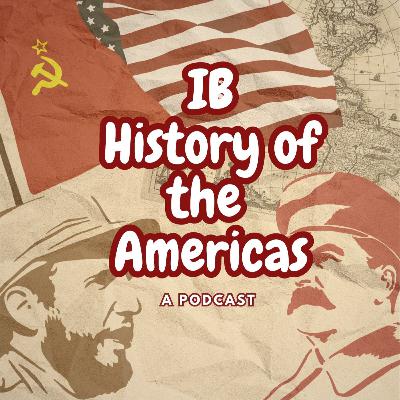Discover IB History of the Americas: A Podcast
IB History of the Americas: A Podcast

IB History of the Americas: A Podcast
Author: EM Productions
Subscribed: 3Played: 8Subscribe
Share
© EM Productions
Description
This podcast is intended to provide educational support content to students enrolled in an IB History of the Americas course. This project was made possible by a group of outstanding students from South Texas who were willing to share their time and knowledge to create an audio study guide of some of the most common IB History topics taught around the world.
8 Episodes
Reverse
Join our hosts, Keiry Vargas and Santiago Garza, as we break down the causes of the Cuban Revolution to help you crush your Paper 3 exam. Why did Cuba rise up in revolution, and how did Fidel Castro turn frustration into action?
From Batista’s corrupt dictatorship to the grip of U.S. businesses on Cuba’s economy, we’ll explore why so many Cubans demanded change. Dive into the social divide between rural poverty and Havana’s elite and discover how revolutionary ideas of nationalism and anti-imperialism inspired a movement.
We’ll explain how political corruption, economic inequality, and a thirst for independence collided to create a perfect storm for revolution.
Tune in, grab a notebook, and take notes!
Join our hosts, Camila Orocio and Rocio Amador, as we take you back to the Cuban Revolution’s key moments. We’ll break down his bold reforms, including land redistribution, free education, and healthcare, that won over many Cubans—but also why these reforms came with a hefty price.
We'll also discuss Castro’s darker side: the abolition of political parties, the imprisonment of dissenters like Huber Matos, and the rise of propaganda and surveillance through neighborhood committees.
This episode is perfect for IB History students prepping for their exams—or anyone curious about how one man’s vision reshaped a nation and defied a superpower. Tune in, take notes, and prepare to ace your next essay on Castro's rise and consolidation of power!
This section focuses on domestic and political developments in Latin America after 1945. Most Latin American countries experienced social, economic, and political changes and challenges. Politically responses to these forces varied from country to country–from the continuation of democracy to "populist" movements to outright conflict, revolution and the establishment of authoritarian regimes in the 1960s and 1970s. Areas of study include: conditions for the rise to power of new leaders; economic and social policies; treatment of minorities. (Description taken from the IB History Guide 2020)
As the world order deteriorated in the late 1930s, resulting in the outbreak of war in Europe and Asia, the countries of the region reacted in different ways to the challenges presented. This section focuses on the changing policies of the countries in the region as a result of growing political and diplomatic tensions prior to, and during, the Second World War. It also examines the impact of the war upon the Americas. (Description taken from the IB History Guide 2020).
This case study for Paper 1 explores Italian expansionism from 1933-1940. The focus of this prescribed subject is on the causes of expansion, key events, and international responses to that expansion. Discussion of domestic and ideological issues should therefore be considered in terms of the extent to which they contribute to this expansion, for example, economic issues, such as the long-term impact of the Great Depression, should be assessed in terms of their role in shaping more aggressive foreign policy. (Description taken from the IB History Guide 2020).
This case study for Paper 1 explores Japanese expansionism from 1931 to 1941. The focus of this prescribed subject is on the causes of expansion, key events, and international responses to the expansion. Discussion of domestic and ideological issues should therefore be considered in terms of the extent to which they contributed to this expansion, for example, economic issues, such as the long-term impact of the Great Depression, should be assessed in terms of their role in shaping more aggressive foreign policy.
This case study for Paper 1 explores German expansion from 1933 to 1940. The focus of this prescribed subject is on the causes of expansion, key events, and international responses to the expansion. Discussion of domestic and ideological issues should therefore be considered in terms of the extent to which they contributed to this expansion, for example, economic issues, such as the long-term impact of the Great Depression, should be assessed in terms of their role in shaping more aggressive foreign policy.
This episode overviews section 16: The Cold War and the Americas (1945-1981). This section focuses on the development and impact of the Cold War on the region. Most of the second half of the 20th century was dominated by the global conflict of the Cold War. Within the Americas, some countries were closely allied to the United States and some took sides reluctantly. Many remained neutral or sought to avoid involvement in Cold War struggles. A few, influenced by the Cuban Revolution, instituted socialist governments. No nation, however, escaped the pressures of the Cold War, which had a significant impact on the domestic and foreign policies of the countries of the region. (Overview of the section taken from the IB History Guide 2020).





